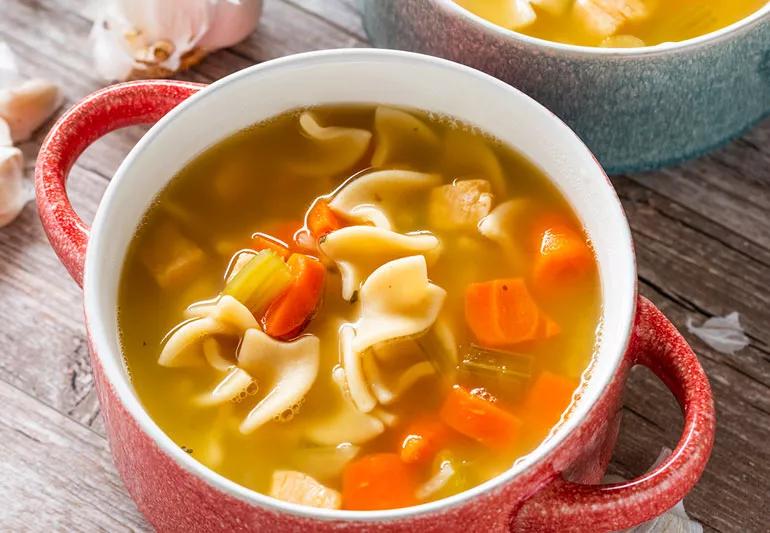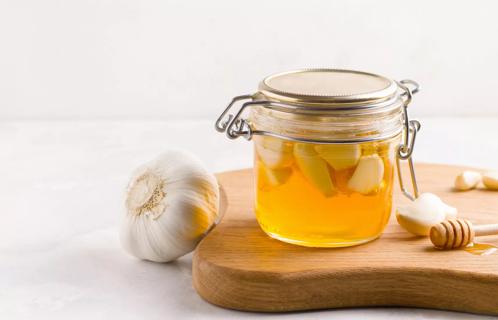How to nourish your body, even when you don’t feel well

While no specific food can cure sickness, sometimes, eating the right thing can relieve symptoms and help you feel better. But keep in mind that what works for one person might not work for another. The best thing you can do when you don’t feel well is to focus on what helps you and what sounds appealing.
Advertisement
Cleveland Clinic is a non-profit academic medical center. Advertising on our site helps support our mission. We do not endorse non-Cleveland Clinic products or services. Policy
Here, dietitian Andrea Dunn, RD, breaks down what foods to eat and drink when you’re feeling under the weather.
Dunn says that when you think about what foods to eat when you’re sick, think about it as three basic categories:
When you’re sick and don’t feel well, you might not have an appetite or you might feel like you can’t keep anything down. But if you’re not eating or drinking, dehydration can quickly set in.
“Oftentimes when we’re sick and don’t feel good, dehydration is a big part of it,” explains Dunn. “It might be because you’re throwing up or running to the bathroom every five minutes. Or you might feel so sick that you just don’t have an appetite.”
But dehydration is one of the biggest reasons why people end up in the emergency room when they’re sick.
You might be so dehydrated that you can’t walk or you pass out and hit your head. Moderate to severe dehydration needs quick medical attention. If left untreated, dehydration can cause urinary or kidney problems, seizures and can even be life-threatening.
Advertisement
Here’s what to eat and drink when you’re dehydrated or to avoid becoming dehydrated:
Diarrhea is when food is moving too quickly through your body. You’ll want to focus on eating foods that can slow that process down, which means choosing foods that contain soluble fiber. This type of fiber acts as a thickening agent and adds form to the stool to help slow it down.
Dunn says that when your gut is sick, you’ll want to avoid or limit caffeine and sugar alcohols. Caffeine can overstimulate your digestive system and make diarrhea worse. Sugar alcohols don’t get absorbed in the gut and instead hang out in your large intestine, which can lead to bloating, stomach pain and more diarrhea.
Here’s what to eat and drink when your gut is sick:
Advertisement
From the stomach flu, to food poisoning, to pregnancy – feeling nauseated can derail your entire day. And nausea can run the full spectrum, from vomiting, to feeling an overall sense of queasiness, to dry heaving.
“When you’re feeling nauseous or have a stomachache, you should really try to eat every couple of hours,” says Dunn. “Eating small amounts more frequently can help get a little food at a time into your system.”
Here’s what to eat and drink when you’re nauseous:
When you’re hit with the flu, a cold or general crud, the last thing you’ll want to do is leave your home or go to the store and spread your germs. Instead, stock up on food now to have on hand in case you or someone in your house gets sick.
Advertisement
Stock up on:
Advertisement

Sign up for our Health Essentials emails for expert guidance on nutrition, fitness, sleep, skin care and more.
Learn more about our editorial process.
Advertisement

They’re viral cousins, but enteroviruses are more likely to cause serious illness

You can’t cure a cold, but these simple home remedies can help you feel better faster

Don’t expect miracles out of ‘immune-boosting’ supplements when you’re sick

Sinus infections tend to last longer and include symptoms like facial pressure and discolored mucus

Enteroviruses are often to blame for summer colds, leading to a runny nose, sore throat and digestive symptoms

Stress and unhealthy habits can lead to more colds, but taking some precautions may help you stay well

On their own, honey can help soothe a sore throat and garlic has immunity-boosting properties, but you don’t need to go the fermented route

Symptoms can overlap and be hard to distinguish, but there are some telltale differences

Even small moments of time outdoors can help reduce stress, boost mood and restore a sense of calm

A correct prescription helps your eyes see clearly — but as natural changes occur, you may need stronger or different eyeglasses

Both are medical emergencies, but they are very distinct events with different causes